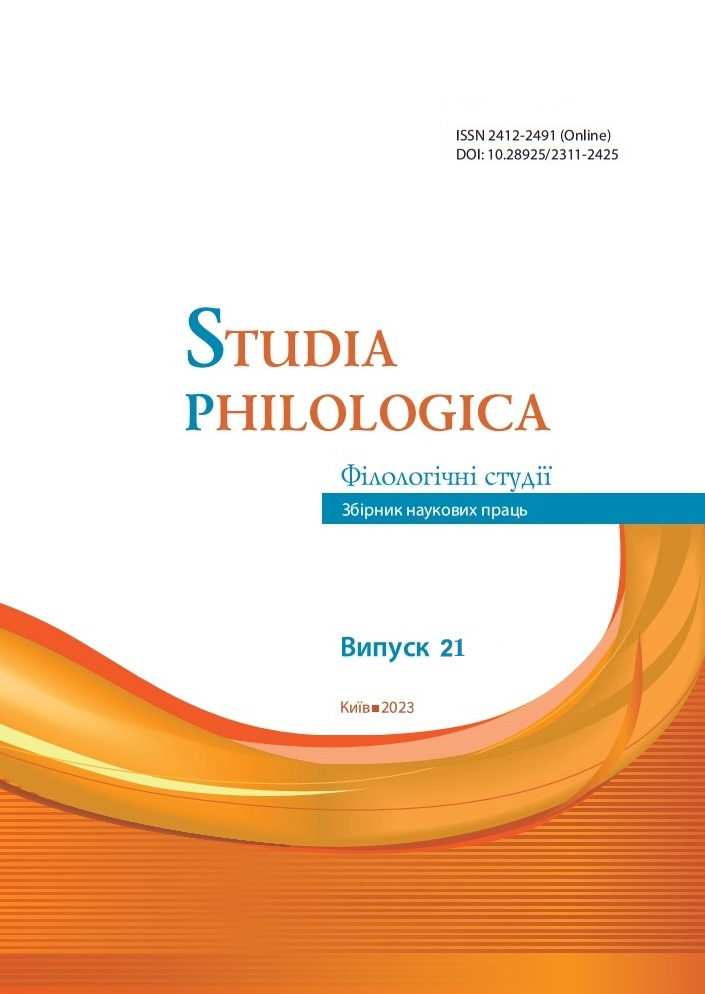Negation, Truth and Falsity
DOI:
https://doi.org/10.28925/2311-2425.2023.211Keywords:
negation, truth, falsity, linguistic analysis, pragmatic universal.Abstract
The present article includes thematically connected questions on negation in the areas of the philosophy of logic, philosophical logic and metaphysics. It highlights a central problem negation poses to a certain area of philosophy. The purpose of the article is also to analyze negation in the areas of the philosophy of logic, philosophical logic and metaphysics. It highlights a central problem negation poses to a certain area of philosophy. It includes historical references, puts the problems discussed into context, and ties together a number of the main themes and problems. The investigation discusses the problem of logical revisionism and whether there is any room for genuine disagreement, and hence shared meaning, between the classicist and deviant’s respective uses of ‘not’. If there is not, revision is impossible. We argue that revision is indeed possible and provide an account of negation as contradictoriness according to which a number of alleged negations are declared genuine. Among them are the negations of FDE (First-Degree Entailment) and a wide family of other relevant logics, LP (Priest’s dialetheic “Logic of Paradox”), Kleene weak and strong 3-valued logics with either “exclusion” or “choice” negation, and intuitionistic logic. We also discuss the problem of furnishing intuitionistic logic with an empirical negation for adequately expressing claims of the form ‘A is undecided at present’ or ‘A may never be decided’ the latter of which has been argued to be intuitionistically inconsistent. We reveal the importance of various notions of consequence-as-s-preservation where s may be falsity (versus untruth), indeterminacy or some other semantic (or “algebraic”) value, in formulating rationality constraints on speech acts and propositional attitudes such as rejection, denial and dubitability. The article provides an account of the nature of truth values regarded as objects. It is argued that only truth exists as the maximal truthmaker. The consequences this has for semantics representationally construed are considered and it is argued that every logic, from classical to non-classical, is gappy. Moreover, a truthmaker theory is developed whereby only positive truths, an account of which is also developed therein, have truthmakers. We investigate the definability of negation as “absolute” impossibility, i.e. where the notion of necessity or possibility in question corresponds to the global modality.
Keywords: negation, falsity, metaphysics, logic, proposition.
Downloads
References
Anderwald L. (2002). Negation in non-standard British English. Gaps, regularizations and asymmetries.London and New York : Routledge.
Anderwald L. (2005). Negative concord in British English dialects. Aspects of English negation. John Benjamins : Amsterdam ; Philadelphia ; Tokyo.116 – 137.
Aristotle, [Cat.] and [De Int.]. (1963). Categories and De Interpretatione, ed. and trans. by J. Ackrill. Oxford.
Aristotle's Metaphysics: Annotated Bibliography of the Twentieth-Century Literature (1997). By R.Radice and R.Davies, pref. by G.Realel. Leiden–N.Y–Köln.
Bergson H. (1954) An Introduction to Metaphysics, ed. and trans. by T. E. Hulme. New York: Subsidiary of Howard W. Sams & Co.
Burchfield R. (1994). Introduction. The Cambridge history of the English language. Vol. V. English in Britain and oversees : Origin and development. Cambridge : Cambridge University Press. 1 – 19.
Givón T. (1993). English grammar. Amsterdam and Philadelphia: John Benjamins.
Haegeman L. (1995). The syntax of English negation.Cambridge : Cambridge University Press.
Horn L. (1989). A natural history of negation.London; Chicago : University of Chicago Press.
Iyeri Y. (1999). Multiple negation in Middle English verse.Eds. Ingrid Tieken-Boon van Ostade, Tottie, Gunnel and Wurff, Wim van der.Berlin; New York : Mouton de Gruyter.
Iyeri Y. (1999). Negative Construction in Middle English.Eds. Ingrid Tieken-Boon van Ostade, Tottie, Gunnel and Wurff, Wim van der.Berlin; New York : Mouton de Gruyter.
Jespersen O. (1940). A modern English grammar on historical prin¬ciples. Part V : Syntax. Copenhagen : Ejnar Munksgaard.
Jespersen O. (1917). Negation in English and other languages. De Kgl. Danske Videnskabernes Selskab. Historisk-Filologiske Meddelelser I.5. Copenhagen. Reprinted in 1962 / Selected Writings of Otto Jespersen. – London : Allen and Unwin.
Mazzon G. (2004). A history of English negation. London : Pearson-Longman.
Tieken-Boon van O. (1994). Multiple Negation in Malory’s Morte Darthur.Berlin; New York : Mouton.
Tieken-Boon van O. (1995). The Two Versions of Malory’s Morte Darthur: Multiple Negation and theEnding of the Texy. Berlin; New York : Mouton.
Tottie G. (1983). Much about not and nothing: a study of the variation between analytic and synthetic negation in contemporary American English. Publications of the Royal society of letters at Lund, 1983-1984. Lund : Gleerup.
Tottie G. (1991). Negation in English speech and writing.San Diego; London : Academic Press.
Tottie G. (1985). The negation of epistemic necessity in present-day British and American English.English world-wide, № 6/1.87 – 116.
Tottie G. (1982). Where do negative sentences come from? Studia linguistic, № 36. 88 – 105.

Published
How to Cite
Issue
Section
License
Copyright (c) 2023 CC BY 4.0 DEED Attribution 4.0 International

This work is licensed under a Creative Commons Attribution 4.0 International License.

